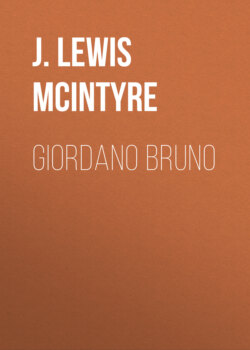Читать книгу Giordano Bruno - J. Lewis McIntyre - Страница 16
На сайте Литреса книга снята с продажи.
X
ОглавлениеTable of Contents
Paris: Oct. 1585-June 1586.“In Paris I spent another year in the house of gentlemen of my acquaintance, but at my own expense the greater part of the time: because of the tumults I left Paris, and went from there to Germany.”[80] So Bruno told the tribunal at Venice; but the duration of his second visit to Paris was from October 1585 to June 1586. The Church.One of his first steps was to make further efforts towards reconciliation with the Church: he presented himself for confession to a Jesuit father, while consulting with the Bishop of Bergamo (the Papal Nuncio), but they were unable to absolve him, as he was an apostate. What Bruno wished was that he might be received into the Church without being compelled to return again to the priesthood, and he begged the Nuncio to write to the Pope Sixtus V. on his behalf. The Bishop, however, had no hope of the favour being granted, and declined to write unless Bruno agreed to return to his order. To the same effect was the advice of the Jesuit father Alfonso Spagnolo to whom he was referred; to obtain absolution from the Pope he must return to the order—to his bonds, in other words; and without absolution he could not enjoy the privileges either of mass or of the confessional.[81] This idea Bruno could by no means entertain, and therefore he resigned himself to his position as an alien to the Catholic Church. He had no intention of remaining in Paris, where perhaps his Italian writings had made him no longer acceptable, but he desired not to leave it without some recognition of the favour shown him there in the past. The means he adopted was a public disputation, to be held in the Royal Hall of the university at Pentecost of the year 1586. These disputations of the learned were a delight to the youth of the time, and drew audiences comparable in our own time only to great football or cricket matches.[82] The 120 Theses.He drew up one hundred and twenty theses against the Peripatetic Philosophy, which still formed the substance of the teaching at the Sorbonne; and his side was taken up by the rival, more modern, college of Cambray (afterwards the College of France), of which he appears now to have become an associate.[83] It was the custom of the real propounder of the theses to preside at the debate, leaving it to another to act as protagonist, and intervening only when the latter’s discomfiture was imminent. In this case Bruno chose a young Parisian nobleman of his own following—John Hennequin, a Master of Arts—but we may well imagine that he did not long keep silent himself. We have no knowledge of how the debate went, but it cannot have been too favourable to Bruno, for he left Paris immediately afterwards. Its date was the 25th of May; Bruno, therefore, left Paris probably in early June 1586.
Criticism of Peripatetic Theory.The articles, with a note of explanation attached to each, and an introduction to the whole—(Excubitor, the Awakener)—being the address of Hennequin at the beginning of the disputation, but written by Bruno himself—were published in Paris and again at Wittenberg.[84] They contain a temperate but powerful criticism of the Aristotelians, by the words of Aristotle himself, and of Aristotle from the standpoint of Bruno’s own physical theory, which he believed to be that of the Pythagoreans and Platonists. The right to criticise the “divine” Aristotle, Bruno claimed on the same grounds as those on which Aristotle himself enjoyed the right of criticising his predecessors: we are to him as he to them: their truth, which to him seemed error, may be right to us again, for opinion, like other history, moves in cycles. And as to authority, the mass of which was against Bruno, “if we are really sick, it helps us nought that public opinion thinks we are really making for health.”[85] “It is a poor mind that will think with the multitude because it is a multitude: truth is not altered by the opinions of the vulgar or the confirmation of the many”—“it is more blessed to be wise in truth in face of opinion than to be wise in opinion in face of truth.”[86] The new philosophy gives wings to the mind, to carry it far from the prison cell in which it has been detained by the old system, and from which it could look out upon the orbs of the stars only through chinks and cracks:—to carry it out into infinite space, to behold the innumerable worlds, sisters of the earth, like it in heart and in will, living and life-producing; and returning, to see within itself—“not without, apart, or far from us, but in ourselves, and everywhere one, more intimate, more in the heart of each of us, than we are to ourselves”[87]—the divine cause, source, and centre of things. Aristotle and the sources of the scholastic philosophy were occupying Bruno’s leisure almost exclusively at this time: he had begun the great Latin work, the De Immenso, which was to see the light in Frankfort; and he published in this year a commentary on the physics of Aristotle as well as an account of a mathematical and cosmometric invention of one Fabrizio Mordenti, which seems to be of much less value than Bruno supposed.[88]
